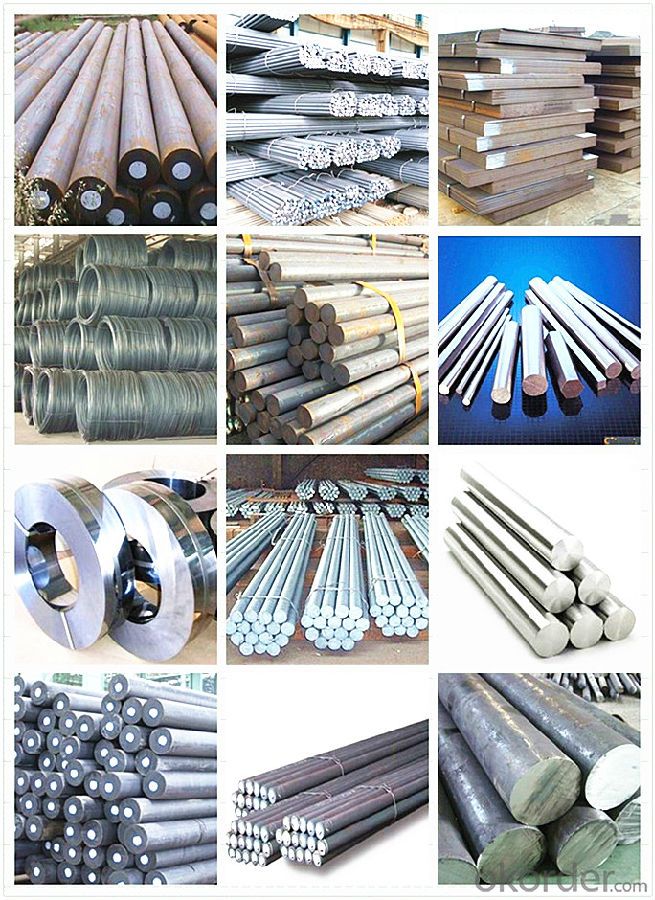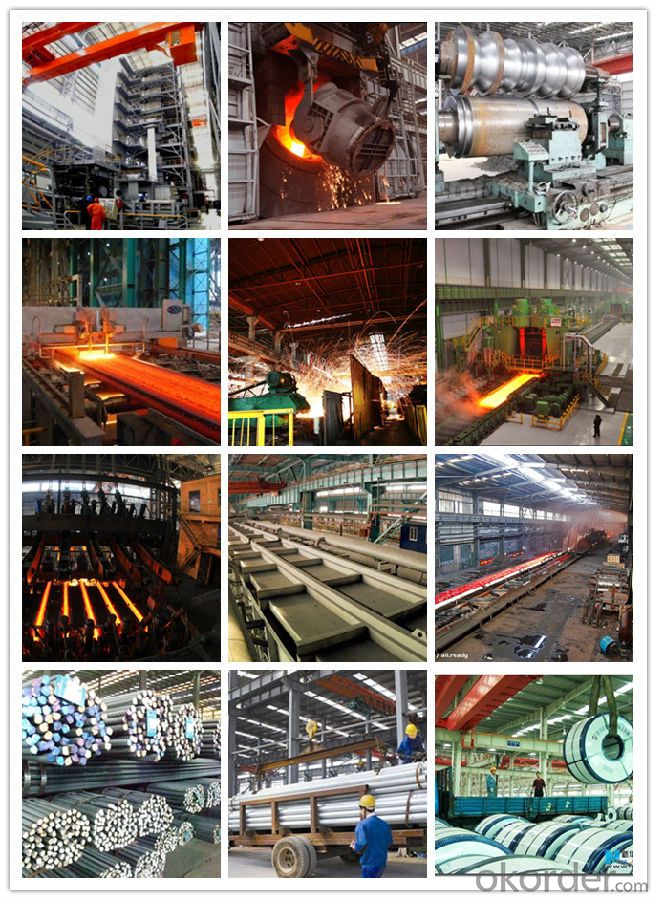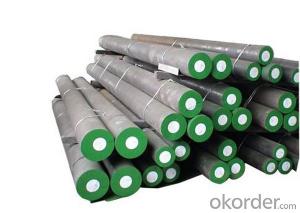Special Steel Sae 5160 6150 1.8159 Spring Steel
- Loading Port:
- China main port
- Payment Terms:
- TT OR LC
- Min Order Qty:
- 30 m.t.
- Supply Capability:
- 10000 m.t./month
OKorder Service Pledge
OKorder Financial Service
You Might Also Like
Item specifice
Product information:
Size Tolerance:
Length tolerance: +100mm/-0mm
Straightness: max 3mm/m
Tensile Strength(Mpa) | Yield Strength(Mpa) | Elongation | Reduction of area | Hardness |
≥1225 | ≥ 1080 | ≥ 9 | ≥ 20 | <=321HB |
Tensile Strength(Mpa) | Yield Strength(Mpa) | Elongation | Reduction of area | Hardness |
≥1274 | ≥ 1127 | ≥ 10 | ≥ 40 | <=321HB |
Quality Contain
Both end of each bar must be cut.
Ladle furnanced and vacuum de-gassed
Show heat No. on each bar
Surface condition the surface of the hot rolled square bar shall befree cracks, scar and wrinkles that affect the use of the billets. In case there is the above-mentioned defect, it shall be remove.
The mill test certificate shall show the chemical composition, and it is guaranteed that the chemical composition shall be within the limit stipulated in the contract.
Product Show:

Workshop Show:

Shipping
1. FedEx/DHL/UPS/TNT for samples, Door-to-Door;
2. By Air or by Sea for batch goods, for FCL; Airport/ Port receiving;
3. Customers specifying freight forwarders or negotiable shipping methods!
Delivery Time: 3-7 days for samples; 5-25 days for batch goods.
Payment Terms
1.Payment: T/T, L/C, Western Union, MoneyGram,PayPal; 30% deposits; 70% balance before delivery.
2.MOQ: 1pcs
3.Warranty : 3 years
4.Package Informations: 1) EXPORT, In 20 feet (GW 25 ton) or 40 feet Container (GW 25 ton)
2)as customer's requirement
Why choose us?
(1) The leading exporter in China special steel industry.
(2) Large stocks for various sizes, fast delivery date.
(3) Good business relationship with China famous factories.
(4) More than 7 years steel exporting experience.
(5) Good after-sales service guarantee.
- Q:What are the different magnetic grades of special steel?
- There are several different magnetic grades of special steel that are commonly used in various applications. Some of the most common magnetic grades include: 1. Soft Magnetic Materials: These grades of special steel are designed to have high magnetic permeability and low coercivity. They are used in applications where a high magnetic induction is required, such as in transformers, electric motors, and magnetic cores for electrical devices. 2. Martensitic Stainless Steels: These grades of special steel have a high magnetic permeability and are magnetic in their hardened state. They are commonly used in applications such as cutlery, tools, and certain automotive components. 3. Ferritic Stainless Steels: These grades of special steel have a lower magnetic permeability compared to martensitic stainless steels, but they are still magnetic. They are commonly used in applications such as automotive exhaust systems, decorative trim, and appliances. 4. Duplex Stainless Steels: These grades of special steel possess a mixed microstructure of austenite and ferrite, resulting in a magnetic response. They are known for their high corrosion resistance and are used in applications where both strength and corrosion resistance are required, such as in chemical processing equipment and offshore oil and gas platforms. 5. Austenitic Stainless Steels: These grades of special steel are non-magnetic in their annealed state. However, they can exhibit slight magnetism when cold worked or if they contain certain alloying elements. Austenitic stainless steels are widely used in various applications, such as in food processing equipment, architectural structures, and medical devices. It's important to note that the presence or absence of magnetism in special steel grades can vary depending on factors such as composition, heat treatment, and processing. Therefore, it is crucial to consider the specific requirements of a particular application when selecting the appropriate magnetic grade of special steel.
- Q:What are the different testing methods for special steel?
- There are various testing methods for special steel, including hardness testing, tensile testing, impact testing, metallographic testing, and non-destructive testing. Each method helps assess different properties of the steel, such as strength, toughness, microstructure, and defects, ensuring its quality and suitability for specific applications.
- Q:Can special steel be machined easily?
- No, special steel is generally not easy to machine due to its higher hardness and strength compared to regular steel.
- Q:How does special steel contribute to the agricultural machinery industry?
- Special steel contributes to the agricultural machinery industry by providing high-strength, durable, and corrosion-resistant materials for the manufacturing of various agricultural equipment and machinery. This type of steel is specifically designed to withstand the harsh conditions and heavy workloads involved in agricultural operations. It helps increase the lifespan and performance of agricultural machinery, ensuring efficient and reliable operations on farms, which ultimately enhances productivity and sustainability in the industry.
- Q:What are the different classifications of special steel?
- Various types of steel alloys fall under the category of special steel, each possessing unique properties and characteristics that make them suitable for specific applications. Special steel can be classified into several categories: 1. Stainless Steel: This special steel contains a high percentage of chromium, which provides excellent corrosion resistance. It also typically includes elements like nickel and molybdenum, enhancing its strength and durability. Stainless steel finds common use in applications requiring resistance to oxidation, heat, chemicals, and wear, such as in food processing, medical devices, and construction. 2. Tool Steel: Specifically designed for manufacturing tools, dies, and molds, tool steel is known for its exceptional hardness, wear resistance, and toughness. Tool steel is further categorized into subcategories like high-speed steel (HSS), cold work steel, hot work steel, and plastic mold steel, each tailored for specific tooling applications. 3. Alloy Steel: This type of special steel contains additional alloying elements besides carbon. These elements, like manganese, silicon, nickel, chromium, and molybdenum, are added to enhance specific properties such as strength, toughness, hardenability, and corrosion resistance. Alloy steels are used in various applications, including automotive components, machinery, construction, and aerospace. 4. Spring Steel: Specifically designed to withstand repeated bending or twisting without permanent deformation, spring steel possesses excellent elasticity and fatigue resistance. It finds applications in springs, suspension systems, and high-performance automotive parts. 5. Bearing Steel: Bearing steel is engineered to provide high hardness, wear resistance, and dimensional stability necessary for manufacturing bearings. It typically contains high levels of carbon, chromium, and other alloying elements, ensuring the required mechanical properties for reliable and long-lasting bearings. 6. Electrical Steel: Also known as silicon steel, electrical steel is specifically designed for electrical applications. It possesses low electrical resistivity and high magnetic permeability, allowing efficient conduction and transformation of electrical energy. Electrical steel is commonly used in transformers, electric motors, and generators. These classifications of special steel emphasize the versatility and tailored properties of different steel alloys, enabling their application in a wide range of industries and specialized uses.
- Q:How does special steel perform under high temperatures?
- Special steel, also known as high-temperature steel, exhibits excellent performance under high temperatures. It maintains its strength, hardness, and resistance to deformation, making it suitable for various applications in extreme heat conditions. Additionally, special steel can withstand thermal stress and oxidation, ensuring its durability and reliability in high-temperature environments.
- Q:What are the different forging techniques used for special steel?
- Some of the different forging techniques used for special steel include open die forging, closed die forging, and ring rolling.
- Q:Is the steel column of the steel structure HM a special steel?
- Because the legs are parallel inside and outside, the legs are at right angles and are assembled and assembled into components to save welding and riveting, and the work load is 25%. Often used in large capacity requirements, large cross section stability, such as buildings, high-rise buildings, as well as bridges, ships, lifting transport machinery, equipment foundation, support, foundation piles.
- Q:Are there any international standards for special steel?
- Yes, there are international standards for special steel. The most widely recognized and accepted international standards for special steel are set by the International Organization for Standardization (ISO). ISO develops and publishes a range of standards that cover various aspects of special steel, including composition, properties, testing methods, and quality requirements. These standards ensure that special steel produced by different manufacturers from different countries meet the same minimum quality and performance criteria. In addition to ISO, there are also other organizations and standards bodies that have their own specific standards for special steel, such as the American Society for Testing and Materials (ASTM) and the European Committee for Iron and Steel Standardization (ECISS). These international standards provide a common framework for the production, trade, and use of special steel across different countries and industries, promoting consistency, reliability, and quality assurance.
- Q:Can special steel be used in extreme weather conditions?
- Yes, special steel can be used in extreme weather conditions. Specialized steel alloys such as stainless steel or weathering steel are designed to withstand harsh environments, including extreme temperatures, high humidity, corrosive elements, and exposure to UV radiation. These steels offer enhanced durability, resistance to corrosion, and excellent structural integrity, making them suitable for various applications in extreme weather conditions.
1. Manufacturer Overview |
|
|---|---|
| Location | |
| Year Established | |
| Annual Output Value | |
| Main Markets | |
| Company Certifications | |
2. Manufacturer Certificates |
|
|---|---|
| a) Certification Name | |
| Range | |
| Reference | |
| Validity Period | |
3. Manufacturer Capability |
|
|---|---|
| a)Trade Capacity | |
| Nearest Port | |
| Export Percentage | |
| No.of Employees in Trade Department | |
| Language Spoken: | |
| b)Factory Information | |
| Factory Size: | |
| No. of Production Lines | |
| Contract Manufacturing | |
| Product Price Range | |
Send your message to us
Special Steel Sae 5160 6150 1.8159 Spring Steel
- Loading Port:
- China main port
- Payment Terms:
- TT OR LC
- Min Order Qty:
- 30 m.t.
- Supply Capability:
- 10000 m.t./month
OKorder Service Pledge
OKorder Financial Service
Similar products
New products
Hot products
Related keywords






























